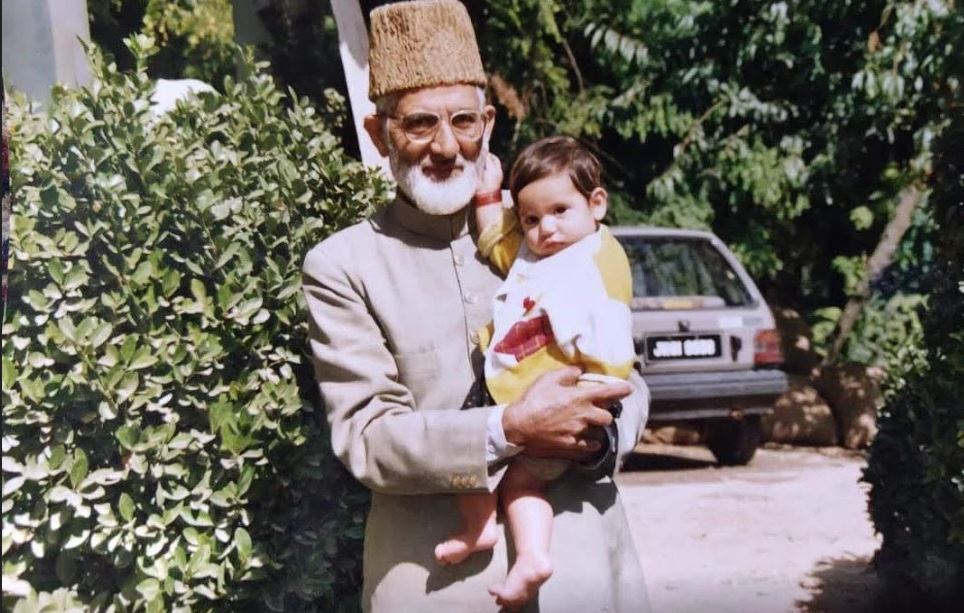AhlulBayt News Agency (ABNA): India's prominent Muslim leader Syed Ali Shah Geelani died at age 92. He passed away in his home city Srinagar on Wednesday night, more than a year after he quit his political activities.
He was buried in the city on Thursday under tight security from Indian officials, and only a small number of his family, including his two sons, were allowed to attend.
A police source told Aljazeera network that the Kashmiri leader was ill for years. He was under house arrest for 12 years and spent 15 years in various Indian prisons.
Just hours after his death was announced, police and military forces were widely deployed around his home, and restrictions were imposed throughout the area and mobile communications were throttled.
Who was Geelani?
Geelani, a fiery writer and preacher, began his career as a schoolteacher and then joined the Jamaat-e-Islami Kashmir political and religious party in the 1950s. He was elected to the local government three times, but resigned after being elected to join the largest anti-Indian campaign in the late 1980s. He was known as the face of the Kashmiri resistance until the end of his life.
Geelani was an ideologue and a staunch supporter of Kashmir integration into Pakistan.
"As long as India considers Kashmir a disputed territory, does not demilitarize the region and release political prisoners, it cannot be trusted for a serious dialogue," he said, for years rejecting negotiations with Delhi.
Various Indian governments have always rejected his position and labeled him a "radical" politician.
Geelani also chaired the far-right All Parties Freedom Conference, a separatist coalition, before stepping down from politics in June 2020. The Freedom Conference is an association of various political and religious groups in Kashmir that was formed in 1993 to lead the movement to determine the fate of the disputed region. It did not accept Indian rule in Jammu and Kashmir and called for autonomy or joining Pakistan.
Geelani also led public disobedience in the face of New Delhi crackdowns in Kashmir.
In 2019, India revoked the special status given to Jammu and Kashmir under Article 370 of the constitution.
The Jammu and Kashmir region is in center of territorial claims by India and Pakistan, and many Kashmiri Muslims support the unification of the land, whether under Pakistani rule or as an independent state. In contrast, Indian officials consider Kashmir separatists "Pakistani-backed terrorists", an accusation Pakistan denies.
Clashes between Indian forces and armed separatist since 1989 claimed lives of tens of thousands of civilians, insurgents and government forces.
Geelani death and different Indian and Pakistani reactions
Following the news of the death of a controversial Muslim figure, a group of people gathered around his house and mourned him. He was under house arrest for the last decade of his life and suffered from various diseases. The Indian government immediately took strict security measures in the Kashmir to prevent large crowds from attending his funeral. Despite these restrictions, mosques across Kashmir announced his death and called on people to take to the streets. His body was buried in a local cemetery with an order from local authorities.
His son, Nasim, told the Associated Press that his family had planned to bury him in the Cemetery of Martyrs in Srinagar but police had not allowed them to do so.
"They kidnapped his body and buried him by force. None of his family members were present at the funeral. We tried to resist this decision, but they confronted us and even clashed with women," his son was quoted as saying.
Reports from the area suggest that Kashmiris are not leaving their homes, and police and soldiers are patrolling the tense area. More checkpoints have been set up in towns and villages, and government forces have been deployed on many roads, bridges and intersections, installing barricades to control traffic.
Cutting off the internet has been another measure, a common tactic used by the government in Kashmir to prevent protests.
Unlike in India, in Pakistan the government made a meaningful reaction to the Kashmiri leader's death. Upon his death, the government announced one day of national mourning and Prime Minister Imran Khan ordered flags at half staff. Foreign Minister Shah Mahmood Qureshi "strongly" condemned pre-dawn nonpublic burial of Geelani by New Delhi, calling it "barbaric act of snatching of the body" of the late Muslim leader.
/129

